Insects are everywhere, and if you’re spending time outdoors on a camping or hiking trip, you’ll inevitably come in contact with various creepy-crawlies. Camping can make this problem even worse since there are often more insects in the wilderness than other places.
When you’re preparing for your next outing, whether it be a quick daytrip or a week-long camping trip, you should be prepared for the inevitability that bugs can attack (depending on the time of year). Not only can these pests be irritating, but they can also be harmful and potentially cause illness. Follow these tips to ensure your next camping trip isn’t ruined by bug invasions!
So how do you avoid getting bitten by mosquitoes, ticks, ants, bees, wasps, spiders or any of the other pests that love to bite humans? Fortunately there are a number of camping insect repellent solutions to help keep bugs of all types away so you can enjoy outdoor activities!
Contents
Choosing the Right Campsite & Camping Gear to Repel Insects
Before we get into scents and solutions that can help keep away insects, there’s a few steps you can take before and at the beginning of your trip that can help reduce your encounters with bugs from the start.
Insect-Repellent Clothing
Outdoor clothing companies have created clothing that is designed to repel insects by treating them with permethrin, which is an insecticide that the EPA (Environmental Protection Agency) has considered to be effective for over four decades.
However, if you don’t wish to spend extra money on new gear to repel insects, consider packing lightweight long sleeve shirts that cover your arms and light, breathable long pants that cover your legs so you don’t have as much exposed skin. This makes it more difficult for insects to hone in on you and bite you, making it an effective camping insect repellent.
Choose a Good Camping Spot
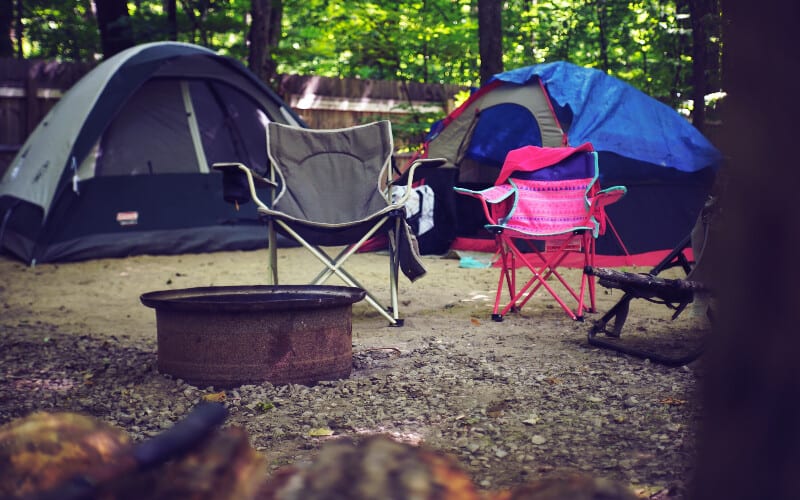
Bugs of all types tend to prefer lush, damp areas, so try to choose a campsite that has less greenery and more dirt or sand (or similar). Additionally, insects tend to enjoy bodies of water, so if there are any rivers, lakes, ponds, or even large puddles nearby, try and set up as far away from them as possible (at least several hundred feet) to keep yourself away from any large mosquito population.
Keep Your Campsite Clean
Not only is keeping your campsite clean good for nature and the environment, but it’s also a great way to avoid attracting insects and other unwanted pests. Leftover foods and wrappers can draw bugs of all kinds, so be sure to dispose of garbage as it’s generated. Cleaning up after yourself can also help prevent wild animals from visiting your campsite.
Insect-Repellent Tents
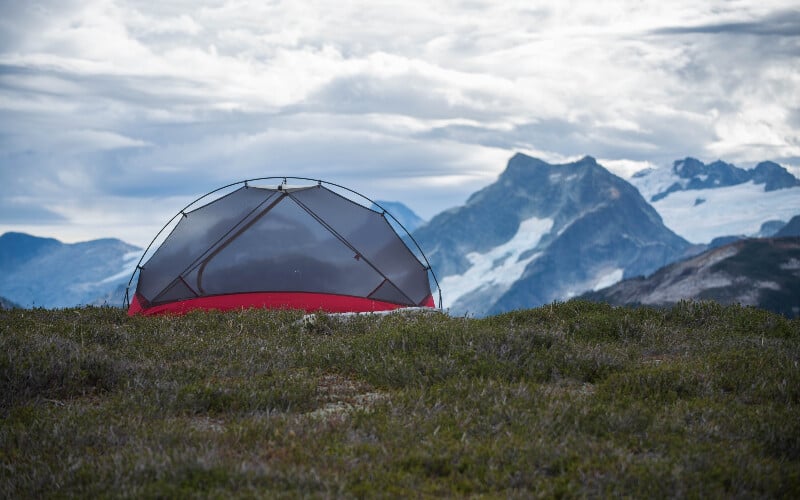
If you’re going to be camping in a tent overnight, bring along a tent that zips closed tightly to help keep pests away while you sleep. If you’re going to be in an area that tends to be overpopulated with bugs, or if you’re going to be sleeping in a hammock, bring along a mosquito net to help add another layer of defense against any type of flying insect while you relax and sleep. If you’re looking for a good tent to protect you, our camping tent buyers guide may be useful.
Similarly, if you’re planning on hammock camping, a mosquito net is a must.
Traditional Insect Repellents
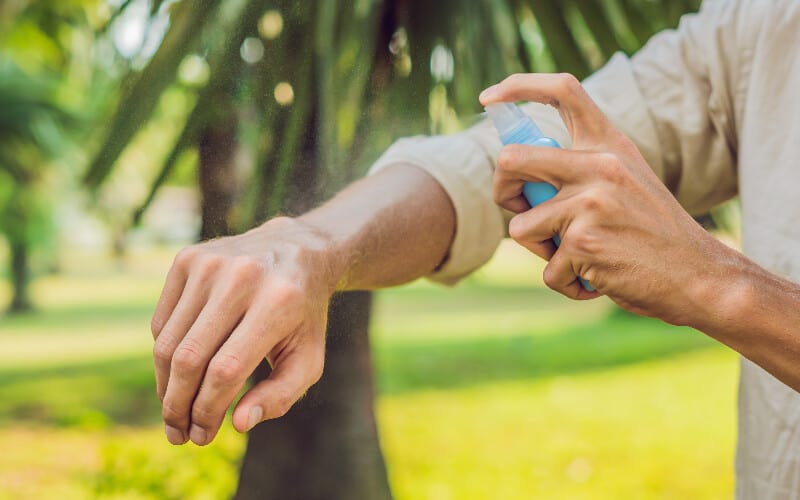
Bug spray is the most common form of camping insect repellent used by people of all ages for all types of outdoor activities.
Most bug sprays (no matter the brand) come in a pump spray bottle, and the most common active ingredient used is DEET.
DEET is considered by many professionals to be the best camping mosquito repellent and most effective active ingredient for bug protection. It can act as an effective bug repellent a variety of insects, including pests that can carry disease such as mosquitoes and ticks.
In general, DEET is considered safe and has been approved by the EPA to be used as a bug spray for people of all ages for about 60 years. Unfortunately, it can negatively affect people with sensitive skin, and it can cause rashes or itching. In rare cases, a bug pump spray containing DEET can cause even cause seizures.
Because of potential adverse side-effects, many people look for alternative options to keep bugs away during their outings. Fortunately, there are many ways to keep bugs away, so you have plenty of options to enjoy your next outing without being harassed by pesky bugs.
Natural Insect Repellents
Even if you’ve picked a camping spot in an area away from insect hotspots, packed clothes that can help keep bugs away, and set up a tent that can help repel pests, you’ll still want some extra shields to keep bugs away while you’re enjoying your time in the wilderness. Natural homemade insect repellent for camping is a popular choice and can be effective when it comes to bug protection.
Vinegar

Apple cider vinegar and white vinegar are both excellent bug repellents. The strong scent and acidity can kill or keep a wide variety of bugs at bay, from mosquitos to ants, ticks, spiders, and more. Because vinegar is safe for humans and animals, you can spray it directly on your skin–or you can spray it around your tent, and around your campsite to add a layer of defense against pests.
However, black flies and biting flies are attracted to the scent of vinegar, so you may wish to fill some bowls with a mixture of vinegar and soap and place them around your campsite (or fill some jars with the mixture and suspend them from nearby tree branches). The scent of the vinegar will attract the flies, but the soap will trap them in the solution.
You can also add a splash of essential oils such as tea tree oil, lavender, or orange peel oil to make it even more effective. While vinegar is human-safe, it may irritate skin and the smell may be overpowering for some, so it’s important to keep this in mind before using vinegar to ward off bugs.
Garlic & Onions

Garlic and onion can both be used as a potent natural insect repellent. A wide variety of bugs hate the smell of garlic, so it can be useful as part of your camping bug defense barrier. You can either hang a few strings of garlic around your campsite to create a barrier, or you can rub garlic directly on your skin.
While garlic and onion don’t smell great to bugs, they also doesn’t smell great to humans. If the idea of you and your camping party smelling of garlic or onion all weekend doesn’t sound appealing, you can ingest either for a similar effect.
You can heavily season your camp meals with garlic and/or onion if you enjoy the taste, or you can bring along some garlic supplements to take throughout your trip. The garlic will seep out of your pores–there will still be a mild smell (especially if you sweat), but it won’t be nearly as pungent as rubbing cloves directly on your body.
Herbs
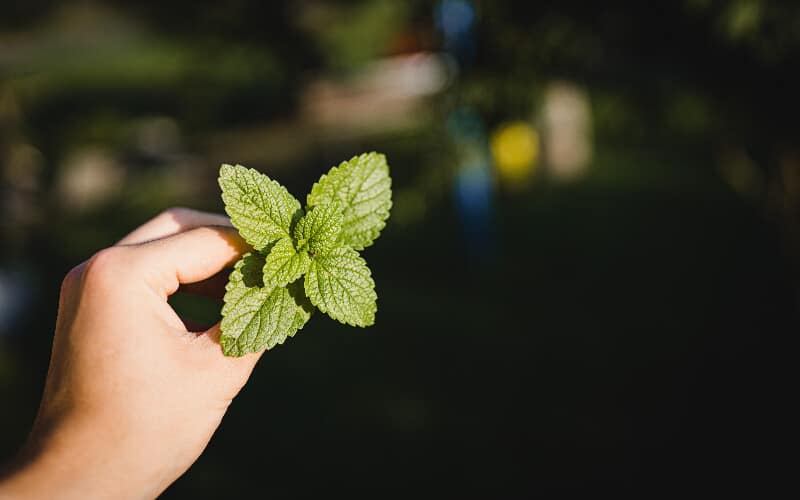
Similar to mint, herbs are another effective repellent that can smell great. Countless people over thousands of years have burned various herbs for all kinds of purposes, from religious to medicinal, and you can harness the power of various herbs to keep bugs at bay on your next camping trip!
Different herbs and herbs have different effects on insects. Below are some of the most common bug repellent herbs to consider bringing on your next trip–you can either rub them on your body periodically, or burn them in your campfire (or both!).
Mint
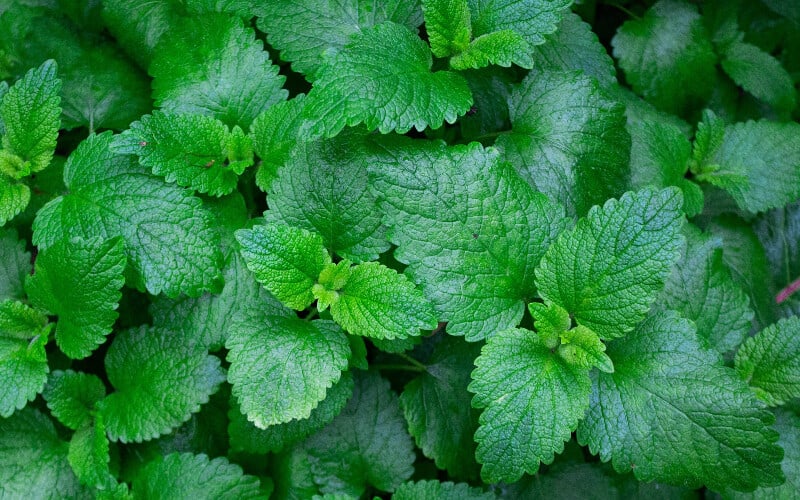
While some natural repellents such as vinegar, garlic, and onion don’t smell great to humans, mint is a refreshing option that actually smells great. Mints such as peppermint and spearmint work great as a natural mosquito repellent that can also repel other pesky insects such as cockroaches, gnats, fleas, lice, black flies, spiders, and more.
If you’re not worried about packing light, you can bring along a few small potted mint plants to place around your campsite where you plan on relaxing.
Sage

Sage is another herb that acts as an effective natural mosquito repellent. By adding some to your campfire, you can create a barrier that will keep the local mosquito population at bay. In addition to being an effective form of mosquito control, sage works well as a natural insect repellent for a variety of species of bugs–and it smells great, too!
Rosemary
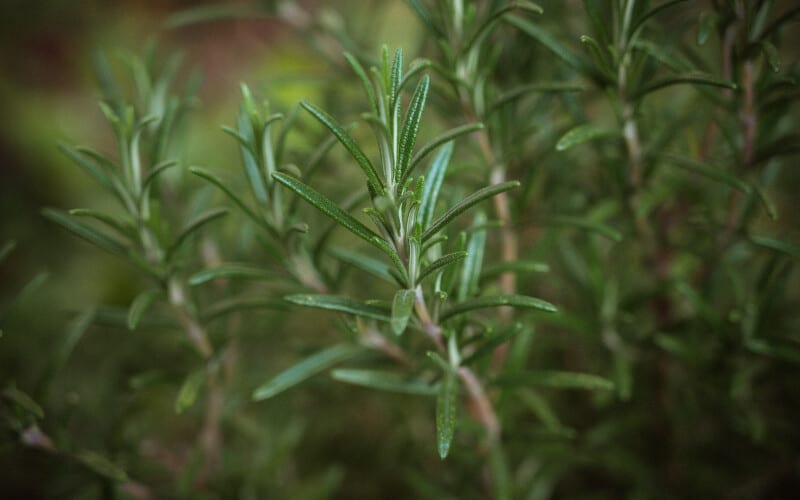
Burning a few springs of rosemary can also work well to repel mosquitos and other insects. Similar to the other herbs listed above, rosemary smells great to humans but insects seem to dislike the smell–plus it’s great for sprucing up your camping meals!
Essential Oils
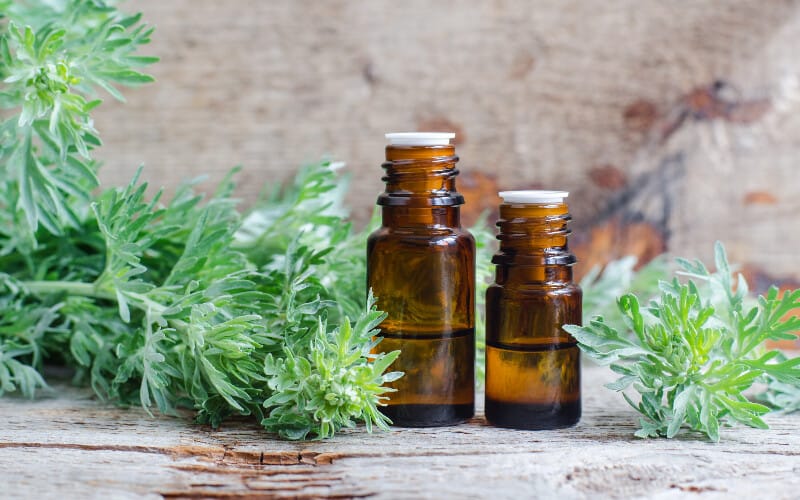
Essential oils are a great solution for helping you repel insect-based pests. With the right concentration of essential oils, they can be used on just about anything, and there are many different types of essential oils that are great for keeping insects away.
Lemon Eucalyptus Oil
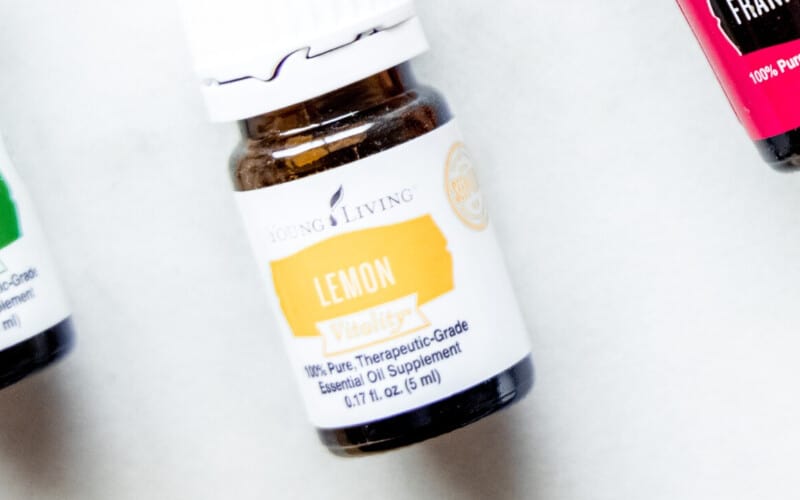
Lemon eucalyptus oil is the only plant-based active ingredient that is approved by the CDC to effectively repel both mosquitoes and ticks. The oil is extracted from the leaves of the eucalyptus citriodora tree (commonly referred to as lemon-scented gum), and it’s a great choice as an insect repellent because it’s long-lasting (it can repel insects for up to 6 hours), it smells great, and it doesn’t leave greasy residue on your skin.
Lavender Oil
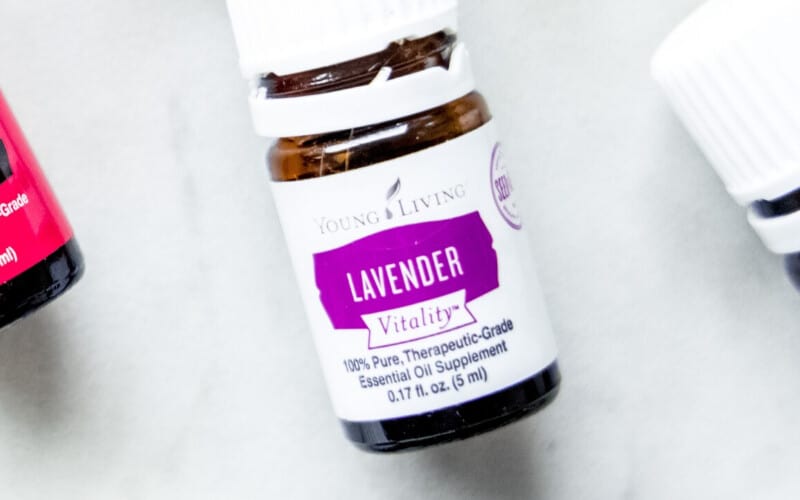
Lavender is a very popular essential oil for the outdoors. It’s an effective repellent for a variety of pests, including mosquitos, ticks fleas, ticks, flies, spiders, ants and moths. Like other essential oils, lavender essential oil smells great–plus it can help you sleep better and reduce stress! It can be safely applied to your skin, and you can spray around your tent and sleeping bag before turning in for the night to enjoy a deep, bug-free sleep!
Peppermint Oil

If you aren’t a fan of the smell of lavender, you can consider using a mint essential oil to keep bugs at bay. Simply pour some in a bug spray bottle and apply mint on your skin, spray around your tent, and around your chairs to repel spiders, ants, stink bugs, and more. As an added bonus, peppermint oil can keep help keep rodents away as well. Plus, you can bring along some peppermint breath mints to use throughout the duration of your camping trip to keep your mouth feeling fresh!
Spikenard Essential Oil
Spikenard oil is another multipurpose oil that you can utilize on your outdoor adventures. Not only does it help keep mosquitos and other flying pests away, but it has been used reduce anxiety and stress. Like lavender oil, it can help you get a better night sleep, so you can utilize it in the evenings as you’re getting ready to lay down for the night.
Essential Oil Concoctions
Different essential oils work well for repelling different types of insects, but combining drops of several oils listed above can create a strong mixture that works well to repel a wide variety of insects and prevent insect bites, while also providing a variety of beneficial effects such as better sleep and reduced stress.
Coffee Grounds

If you enjoy drinking coffee, save your used coffee grounds and allow them to dry before your next camping trip. When you’re at your campsite, pour the dried grounds onto a foil-covered plate and hold a lit match to them until they start smoking. The smoke created will help keep mosquitoes away, and is one of the best camping mosquito repellent options
While you can also recycle your used grounds by sprinkling them into any puddles or standing water around your campsite. Mosquitos can grow from pupae to adults in as little as two days, but sprinkling coffee grounds in their breeding water will kill mosquito larvae them before they can grow. However, sprinkling these coffee grounds around your campsite violates the leave no trace principal, so it’s not a recommended approach.
Diatomaceous Earth

Diatomaceous earth is made up of the fossilized remains of diatoms, which are tiny aquatic organism. These remains are made of silica, which is one of the most common compounds found in the earth’s crust.
It can be scattered around your campsite to create a bug-killing barrier that can keep crawling critters away, though it isn’t effective against any type of flying insect. The particles in diatomaceous earth are are sharp and make tiny cuts in insects’ exoskeletons while absorbing oils and fats, leading to death.
Other Ways to Ward Off Insects
Campfires
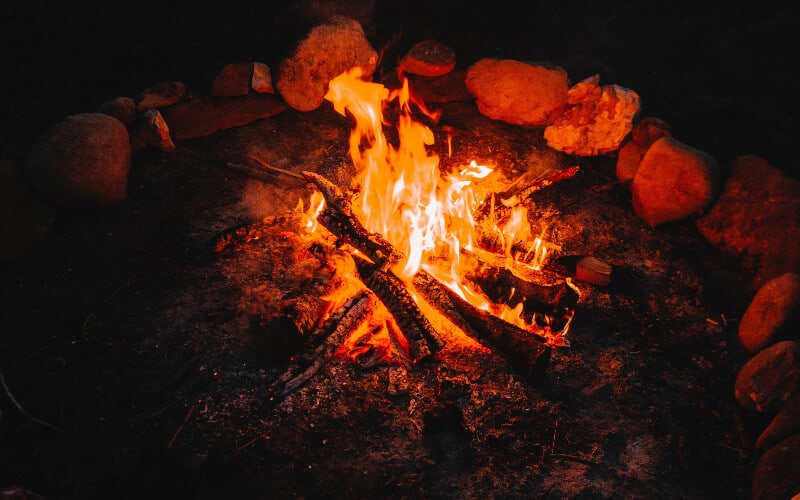
A common question campers ask is: “do campfires keep mosquitoes and insects away?”
Campfire smoke is great for keeping mosquitos and other unwanted pests at bay during your camping trip. To improve the efficacy of your campfire’s insect repellent abilities, consider burning some of the herbs outlined above to add more scents that insects prefer to avoid to make an even stronger barrier. If you need some pointers, check out our guide on how to build the perfect campfire.
Tiki Torches & Citronella Candles
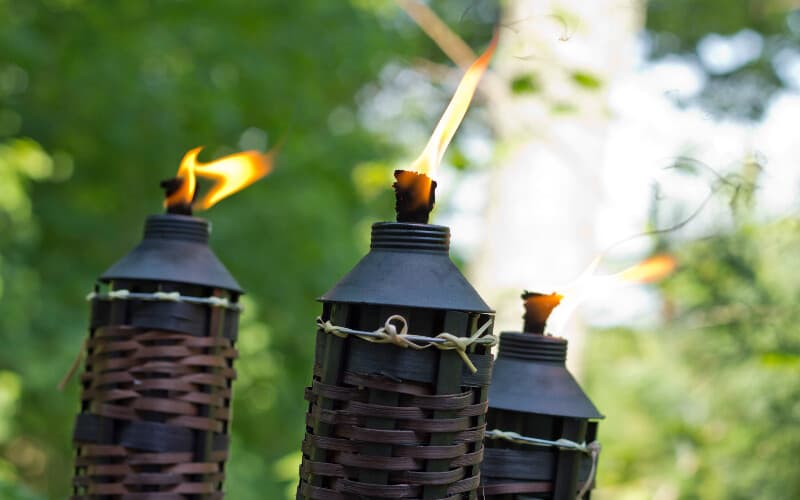
As we discussed in our campsite lighting ideas guide, tiki torches are a fun way to light up your campgrounds and add some atmosphere, but they can also be used to keep mosquitos at bay. Tiki torch fuel contains citronella oil which, when burned, creates a smoke that confuses mosquitoes’ ability to smell you.
However, each torch only creates about a 6 foot diameter of protection, and they aren’t effective on windy days. Lining the perimeter of your campsite with tiki torches won’t repel 100% of mosquitoes, but it can reduce their presence, so it’s a good idea to add some tiki torches to your mosquito control efforts.
Tiki torches can be cumbersome, so you may be looking for more compact alternatives. A citronella candle placed near where you’re sitting can help repel mosquitoes in a similar way as tiki torches–just be aware that a citronella candle generally produces less smoke than a tiki torch, so they won’t create as large of a barrier.
Keep the Lights Low
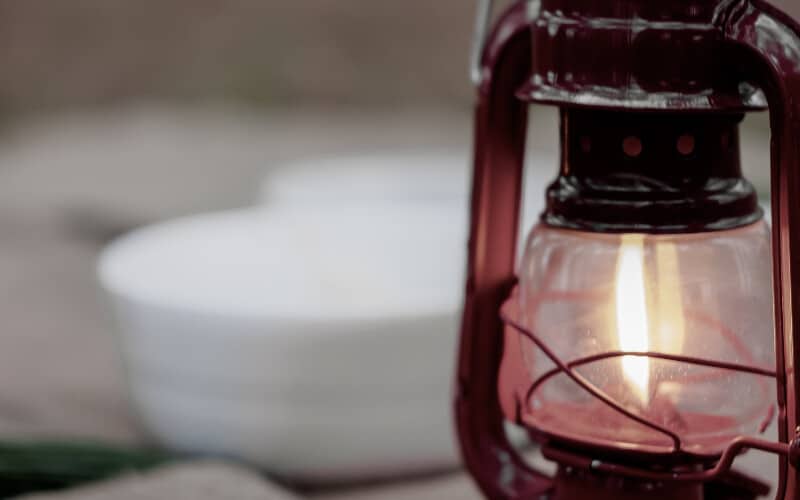
Lights, including flashlights, headlamps, and lanterns, can attract all kinds of insects once the sun goes down. Plan ahead before nightfall each day so you can keep your light usage to a minimum each evening, which can help avoid drawing bugs’ attention.
Avoid Scented Hygiene Products
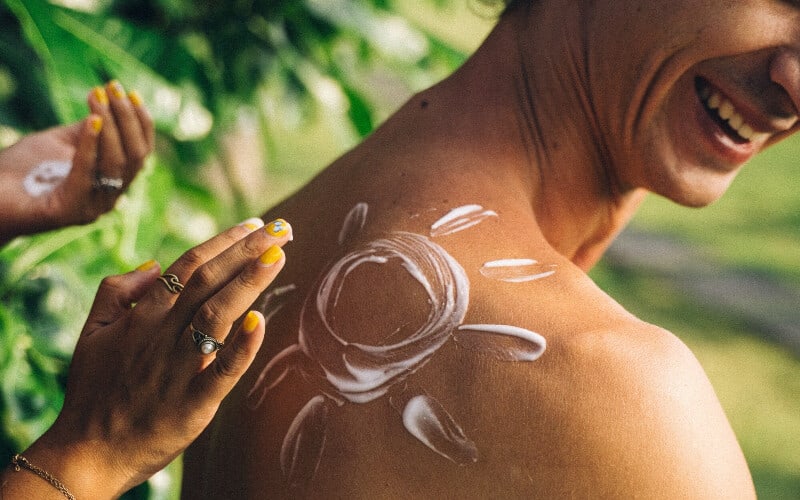
In areas with a high mosquito population (or any types of insects), it’s a good idea to use unscented products to avoid drawing extra unwanted attention from pests.
Floral-scented products (lotions, perfumes, shampoos/conditioners, etc.) are the worst offenders, but anything that puts off a scent can attract insects. Try to stick to fragrance-free hygiene products to keep yourself smelling fresh on your outing. Be sure to pay attention to your sunscreen as well, as some are more neutral-smelling than others. Visit our sunscreen reviews to see which options are best for your next outdoor adventure!
Bug Zappers

While you may think that bringing a bug zapper along on your trip can help you enjoy a bug-free experience, you may want to think twice. While bug zappers do kill insects, they only really kill the insects that wouldn’t bother you anyway.
In fact, a bug zapper can cause a great deal of harm to the local ecosystem–they can disrupt pollination and even affect bird populations over time. Plus they require electricity, which can be impractical depending on your camping setup.
Repellent Mats
If you’d like to use technology to keep bugs away, a repellent mat is a better choice than a bug zapper when it comes to repelling mosquitoes and other insects. These mats are considered to be the best insect repellent device for camping, and are one of the best camping mosquito repellent tools. They’re filled with repellent and sit inside a small portable custom heater that continuously heats the mat to create a wide barrier of protection around your campsite. Each repellent mat can last for 4-12 hours, which can wind up being a bit expensive if you’re planning a longer trip.
How to Treat Bug Bites
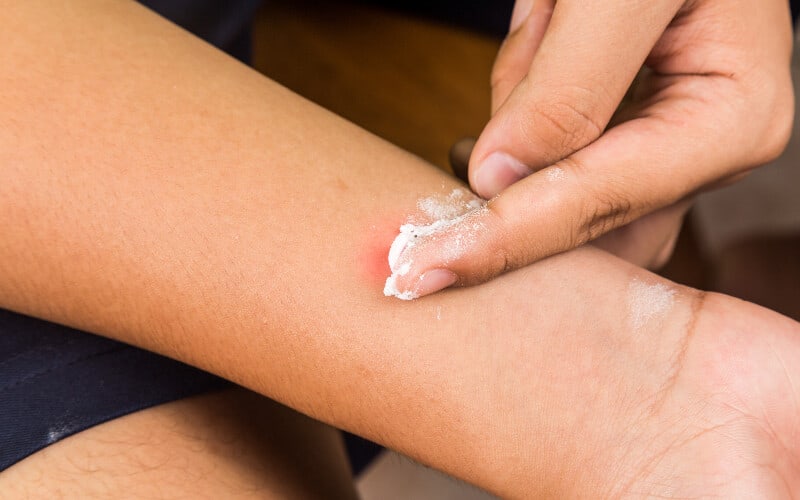
When you’re partaking in any kind of outdoor activity, your risks of bites and stings increases. Different bites and stings can cause different reactions for different people. For many, a bug bite can be more of an inconvenience (such as skin irritation and itching) than anything else.
However, some biting insects can carry diseases, inject venom, or trigger allergies that can create moderate to severe reactions in individuals.
Treating Minor Bite/Sting Symptoms
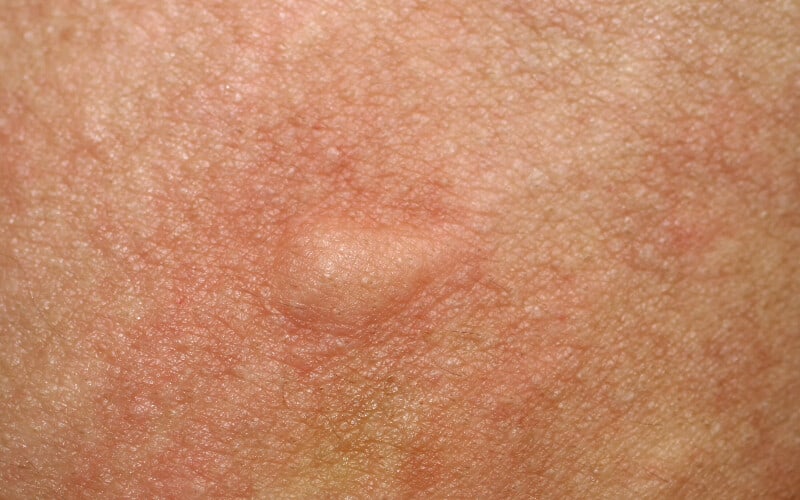
For treating a minor bite with no adverse affects, the procedure is typically fairly simple:
Gently wash the bite with soap and water to clean it (if it’s a sting from a bee or wasp, gently run the flat edge of a credit card or similar across the sting to remove the stinger first).
Then apply an anti-itch cream to the bite/sting and apply a bandage to prevent scratching and infection.
Treating Severe Bite/Sting Symptoms
For more severe reactions to bites and stings, it’s critical to treat victims quickly.
Diseases and illnesses can take days (or longer) to show symptoms, but it’s important to visit a medical professional as soon as possible to prevent more severe health issues.
Allergic reactions (including anaphylaxis) can manifest rapidly and may require first aid to prevent death. Administering an epinephrine (aka adrenaline) shot may be required to reduce the chances of death, and CPR may need to be administered until a medical professional can take over.
Having a well-stocked first aid kit can help with treating both minor and major reactions to bug bites and stings, so it’s important to ensure your kit is well-stocked before your next trip.
Dangers of Insect Bites
Bug bites can cause skin irritation, but they can also be dangerous. As outlined above, most bites and stings will result in minor inconveniences, but more severe and adverse reactions can occur. Below are some common ailments that can arise from different types of bug bites and stings.
Dangers of Mosquito Bites

Bringing along some of the best camping mosquito repellent options is important for a number of reasons. Not only can bites be irritating, but mosquitos can carry a variety of nasty diseases. Not only are mosquitos the most dangerous of all biting insects, they’re actually the deadliest animals to humans on the planet. While most bites only lead to mild, itchy welts, mosquito bites can cause a whole host of illnesses and diseases. Some of the most common include:
West Nile Virus
West Nile Virus (WNV) is one of the most common illnesses caused by mosquito bites. While there are no vaccines to prevent WNV and no treatments to cure it, most people have no symptoms when they have it. According to the CDC, about 20% of people who are infected develop a fever and/or fatigue, and about 1 in 150 people develop a more serious, potentially fatal, illness.
Zika Virus
Zika can lead to fever, rashes, headaches, and muscle and joint pain. Fortunately, symptoms are usually relatively short-lived and often go away on their own in less than a week, and usually don’t require hospitalization. However, Zika can be transmitted from pregnant mothers to their babies, which can cause birth defects and complications.
Chikungunya Virus
People infected with Chikungunya virus generally experience fever and joint pain, headaches, and rashes which usually subsides within a week. Very few people die from it, but in some cases symptoms can persist for weeks or months, and can be quite severe. There are no vaccines or medications to treat the illness, so preventing mosquito bites is the best way to defend against the virus.
Malaria
Malaria is spread by mosquitoes that have previously bitten a person infected with the disease. Symptoms of malaria usually take anywhere from a week to a month to manifest, though the parasites can stay dormant for a year or longer before attacking red blood cells. Some types of malaria can cause recurring symptoms over a period of up to four years.
Common symptoms of malaria are similar to flu symptoms: fatigue, chills, headaches, nausea, vomiting, and diarrhea. Malaria can also cause jaundice (yellowing of the eyes and skin), but it generally subsides on its own. If not treated the disease can lead to more serious symptoms, such as seizures, kidney failure, coma, and even death.
Dengue Fever
Dengue is a fairly mild illness that causes symptoms in about 25% of people who contract it. Common symptoms include fever, nausea, vomiting, pain (muscle, joint, and bone pain), and headaches. While there is no treatment for dengue, symptoms typically clear up in less than a week.
Dangers of Tick Bites
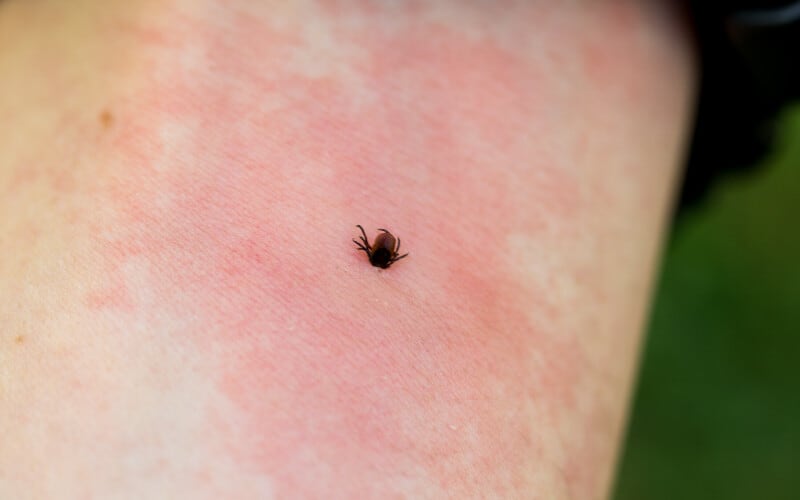
Ticks are common across the United States and the world, and thrive in grass, shrubs, trees, and wooded areas. These blood suckers are closely related to spiders and thrive on human and animals alike. When a tick gets on you, it often navigates to the warmest parts of your body (armpits or groin) and latches itself by burrowing into the skin where it stays for over a week feasting on blood until it eventually detaches itself. Most tick bites are harmless, but can cause issues for those that are allergic. Symptoms can include pain, rashes, blisters, headaches, nausea, and even difficulty breathing if the allergy is severe enough.
Lyme Disease
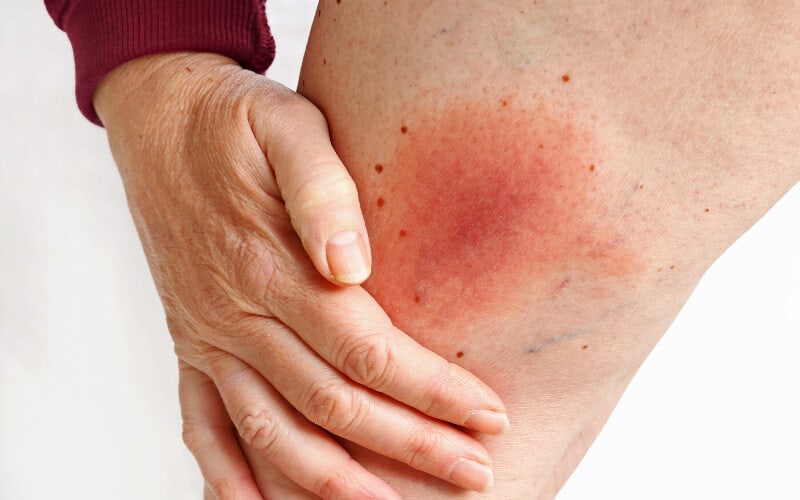
The worst risk of tick bites are the diseases ticks can carry. A common disease transmitted by ticks is Lyme disease, which requires a tick to be latched onto skin for at least 3 days. However, because some ticks are very small and their bites can go undetected, many people who have contracted Lyme disease reported not recalling a tick bite at all. Symptoms of Lyme disease can include a flat, circular rash that resembles a bull’s eye, joint pain, headache and fever, fogged thinking, and trouble sleeping. The sooner Lyme disease is treated, the more effective the recovery.
Rocky Mountain Spotted Fever
Rocky Mountain Spotted Fever (RMSF) is another disease caused by tick bites, and it can cause serious symptoms such as high fevers (102°F+), severe headaches, nausea and vomiting, lack of appetite, abdominal pain, and persistent fatigue. If not treated quickly, RMSF can cause organ failure and can lead to death.
Dangers of Bee Stings
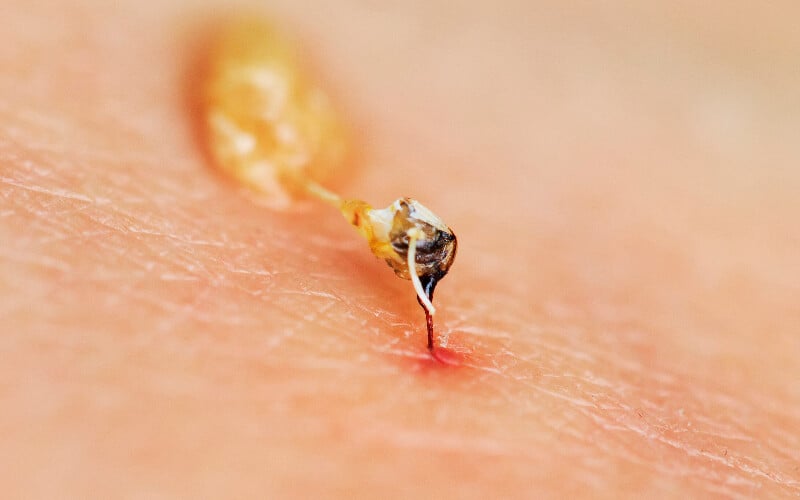
For many people, bee stings are usually nothing more than an irritating inconvenience. A sting may be painful for a moment, but the pain tends to subside quickly. However, for people allergic to bees a sting can quickly become a life-threatening emergency.
Bee stings can cause anaphylaxis, which can result in death if not treated quickly. Symptoms of severe bee sting reactions include shortness of breath and difficulty breathing, a weak pulse, nausea, dizziness, and fainting, among other complications.
Dangers of Wasp Stings
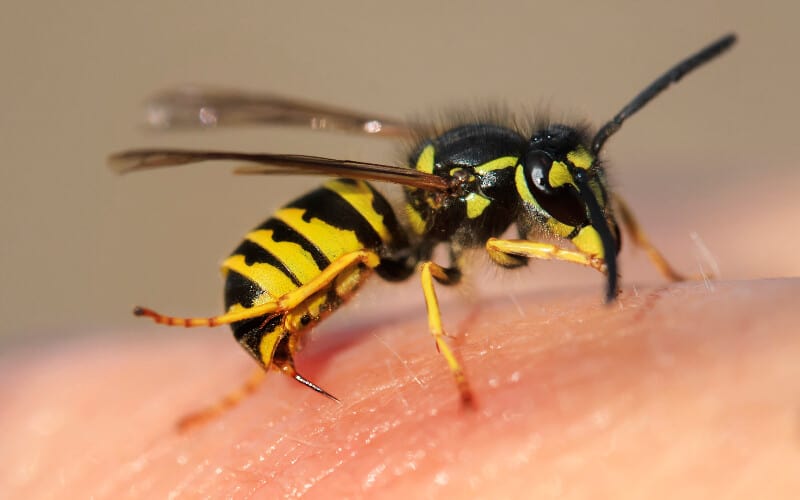
Wasp stings, similar to bee stings, are usually an annoyance more than a danger. However, for people with allergies to wasp stings, allergic reactions can range from semi-dangerous (severe swelling around the sting) to life-threatening (nausea, vomiting, difficulty breathing, fainting, anaphylactic shock, and even death).
However, wasps can be more of a threat because unlike bees, wasps can sting a victim multiple times (whereas a bee can only sting once–their stinger becomes lodged in the skin and detaches from the bee).
Dangers of Ant Bites
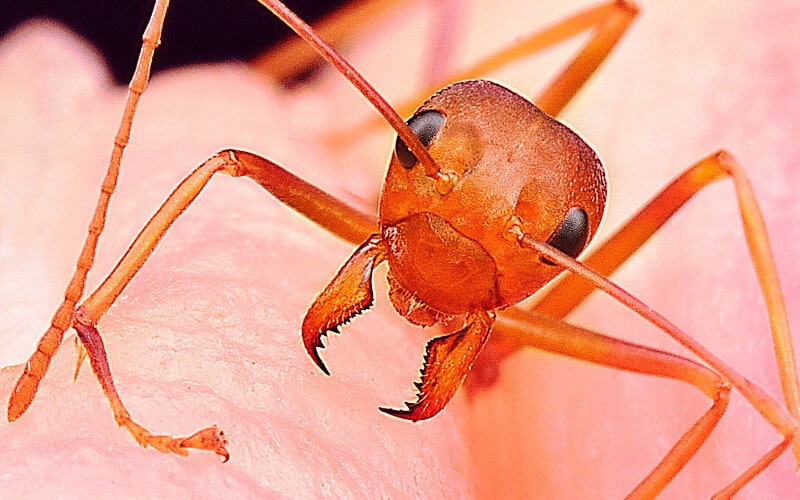
For most people, most ant bites (or stings) are simply a minor irritation. However, fire ant bites or stings can cause sharp pain, though it usually subsides within a few minutes. Some ants, such as carpenter and red harvester ants, are venomous, so a bite from them can cause more serious complications. For those allergic to ant bites, the situation can be much worse–stings from certain types of ants can cause anaphylactic shock and potentially death if not treated quickly.
Dangers of Spider Bites
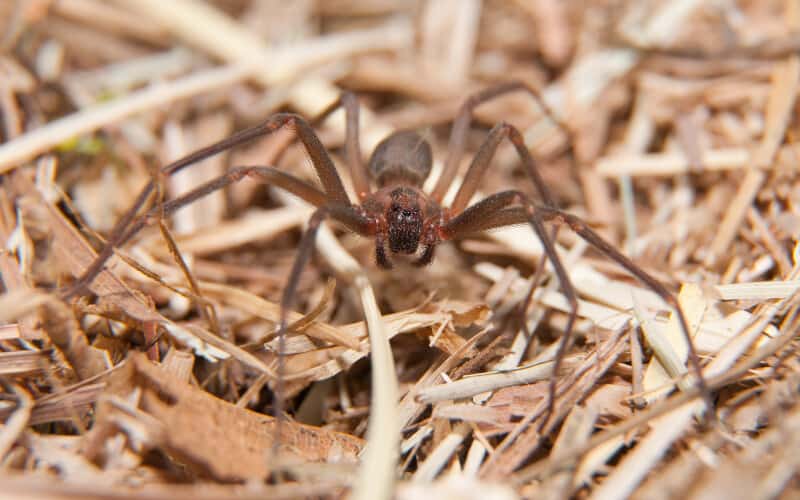
In general, spiders prefer to stay away from humans when possible. However, there’s always a chance a spider may accidentally wander into your tent at night and bite you in your sleep.
Fortunately, most spiders are non-venomous, and most bites will result in mild irritation that heals over a few days. However, there are a number of venomous spiders that can cause illness or death–such as black widows and brown recluses.
Keep an eye on any suspected spider bites. If they appear to spread outward, it’s crucial to get to a medical professional as quickly as possible to begin treatment and minimize damage and reduce chances of major illness or death.
Dangers of Fly Bites
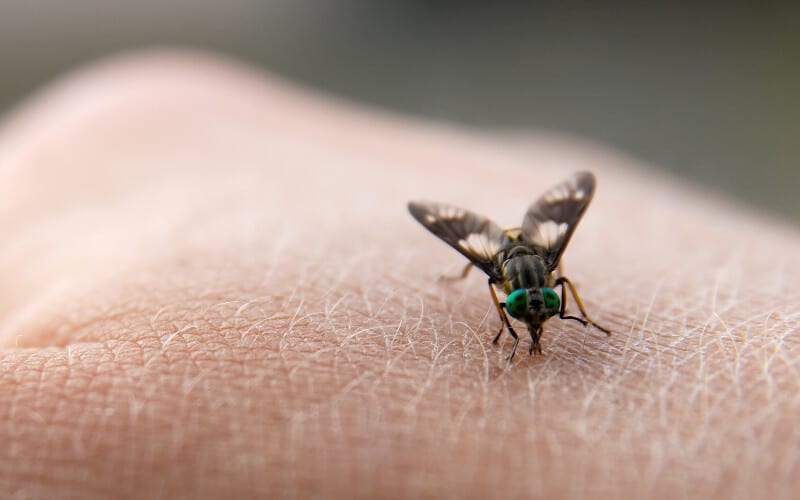
Biting flies can be a major nuisance when you’re trying to enjoy the outdoors. Not only can fly bites cause pain, swelling, and welts, but some flies can even transmit diseases such as rabbit fever. Fly bites can also cause fevers, headaches, nausea, and swollen lymph nodes. Fortunately major complications from fly bites are relatively rare, but rashes and irritated skin are common (especially if you have sensitive skin).
Dangers of Chigger Bites
Bites from chiggers can also be extremely irritating. Fortunately, chiggers don’t carry disease and only feed on skin (not blood), so the chances of chigger bites directly causing any serious complications are slim. However, chigger bites can be extremely itchy, and scratching these bites can lead to infections which can cause more serious health issues. The best way to defend against and chiggers is to limit exposed skin and apply anti-itch ointment if you do get bit to help prevent scratching and infections.
The Best Camping Mosquito Repellent Wrap-Up
If you follow the above tips next time you go camping, and arrive prepared, you should enjoy an (almost) bug-free experience. Of course, it’s impossible to prevent every insect from pestering you, but every line of defense you can implement will help keep pesky insects at bay. These tips, of course, don’t help with keeping animals away from your campsite and out of your food & belongings, so be sure to check out our article: How To Keep Animals Away from Your Campsite.

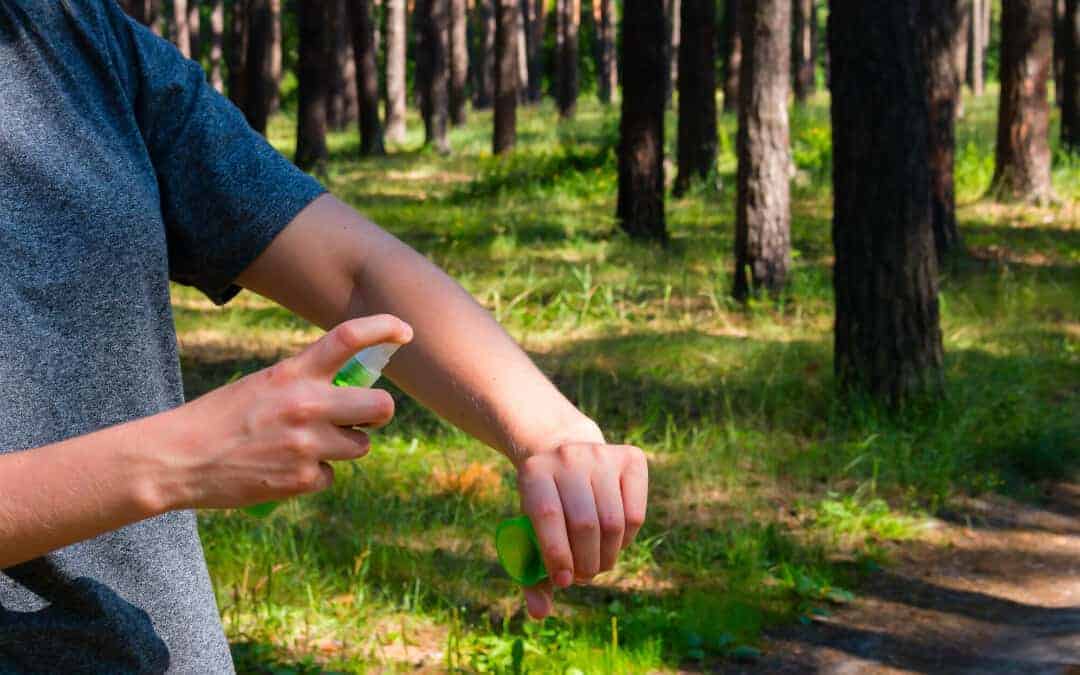
0 Comments